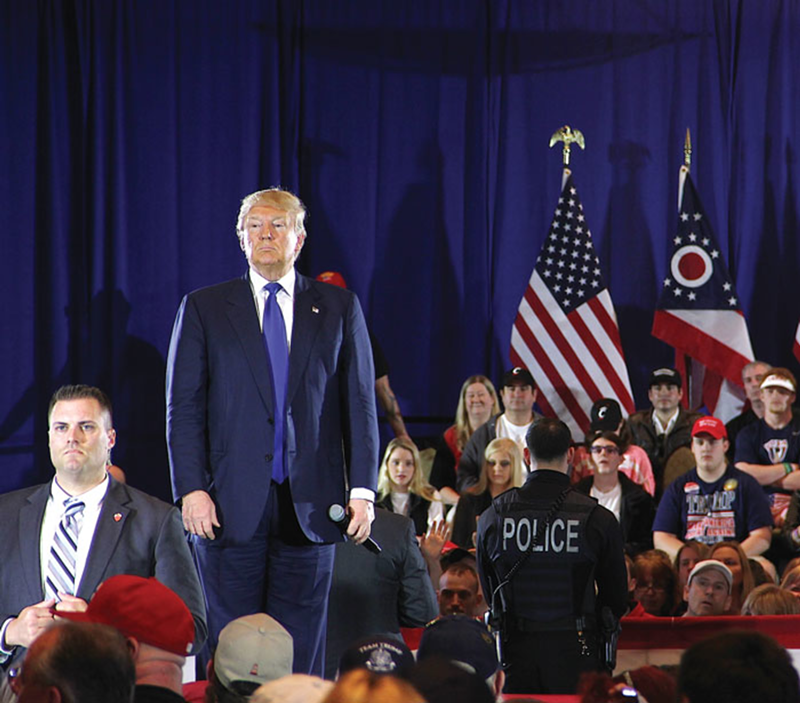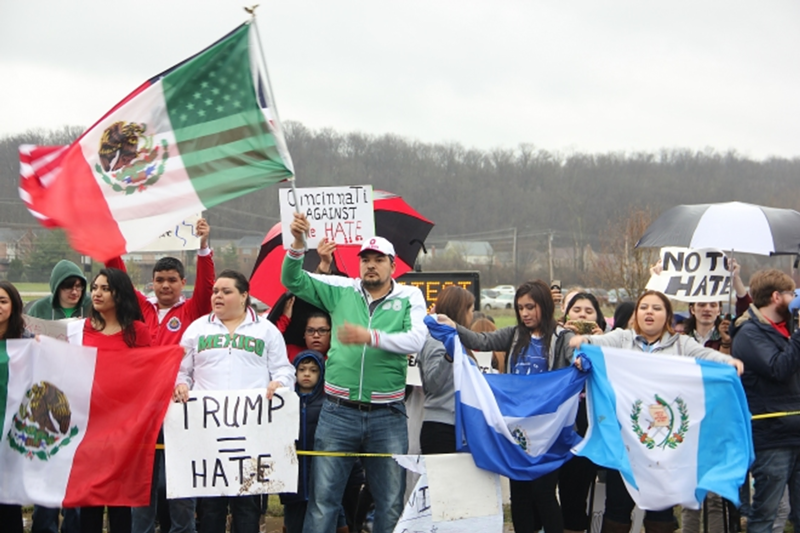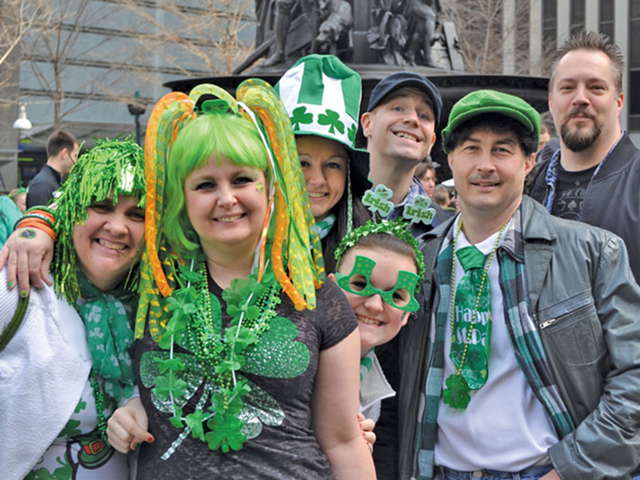
West Chester isn’t known for its political protests, but GOP presidential primary frontrunner Donald Trump brought out the deep divides running through contemporary American politics during his March 13 rally in the sleepy exurb north of Cincinnati.
A line of more than 4,000 people, many standing for hours in the rain, snaked around the 1,700-seat Savannah Center. Nearby, in a “protest zone” created by local law enforcement, a crowd of demonstrators that eventually swelled to more than 450 people held signs and chanted, decrying Trump.
Among the two groups, it was easy to see the larger racial and economic tensions that have come to define the 2016 election. Trump, best known as a real estate tycoon and realty TV star, has gone from a novelty candidate to the frontrunner in the GOP presidential primary, mostly through a vitriolic message that resonates with white voters angry over economic conditions and willing to aim that anger at immigrants, Muslims and social movements like Black Lives Matter. In a hugely important swing state with large numbers of conservative white voters, the rally ahead of Ohio’s March 15 primary offered clues about the deep resentments Trump has harnessed.
Whether he wins or loses Ohio's March 15 primary, those attitudes show no signs of disappearing any time soon.
Clutching umbrellas or speaking from within the hoods of raincoats, Trump supporters in West Chester cited a litany of reasons why they’re backing him: the perceived failures of the mainstream Republican Party, economic concerns, fear of undocumented immigrants, hatred for Democratic presidential hopeful Hillary Clinton.
“Closing the country off to people who are dangerous,” said Myron Gleberman as he stood in line for the rally with his son Joshua. “That resonates with me. Because they’re coming in without skills, without talent, without abilities. They’re not coming here to be Americans, they’re coming here to poach off of Americans.”
To the Glebermans, anti-Trump protesters espoused a viewpoint they found almost unintelligible.
“It makes me feel smart seeing all those stupid people over there,” Joshua said, motioning toward protesters.
“The crazies are the ones on the other side,” his father agreed.
Those protesters represented a broad coalition of activists. Local Muslims decrying Trump’s calls to end immigration from countries in the Middle East, Latino immigration activists angered by his continued calls to build a border wall with Mexico, Black Lives Matter members pushing back against recent violence at Trump rallies against people of color, white labor activists and other groups all chanted “Love Trumps Hate” and “Build Bridges, Not Walls.”
“Donald Trump is the opposite of peace,” a protester who declined to identify himself said. “What our country needs now is peace.”
Trump’s visit came after a number of violent incidents with deep racial overtones have marred the candidate’s rallies.
At a March 9 rally in Fayetteville, N.C., Trump supporter John McGraw punched protester Rakeem Jones in the face as Jones was being led from the building by security. Instead of going after McGraw, law enforcement then tackled Jones. McGraw, who is white, was later charged with assault and disorderly conduct. Jones is black.
“He deserved it,” McGraw later told TV news show Inside Edition. “The next time we see him, we might have to kill him. We don’t know who he is. He might be with a terrorist organization.”
Many detractors have blamed such violence on Trump. He has denied any responsibility for violent acts at his events, but has made statements saying he wishes his supporters could “punch back” and recently said he is looking into paying McGraw’s legal bills.
Trump’s campaign canceled a March 11 rally at the University of Illinois Chicago after protesters there outnumbered his supporters, turning out by the thousands outside the UIC Pavilion and attending the event itself by the hundreds. At least three people suffered minor injuries during confrontations between protesters, Trump supporters and police.
Trump’s West Chester appearance was comparatively uneventful, though there were flashes of conflict. A man in his fifties wearing a leather jacket and a “Hillary Clinton for Prison 2016” shirt gave a barrage of middle fingers and curse words to anti-Trump protesters, while a group of young and middle aged men screamed “build the wall” and “America” at a group of pro-immigration activists. West Chester police and other law enforcement officers stepped between the groups, eventually dispersing the crowds entirely.
Inside the rally, a single protester was removed after he quietly stood up with a sign.
The event itself presented a number of surprises underscoring the topsy-turvy political landscape Trump’s candidacy has created. Damon Lynch IV, son of noted black rights activist Damon Lynch III and recently active himself in Cincinnati’s Black Lives Matter protests, gave the invocation for the event. Hamilton County Sheriff Jim Neil, a Democrat, was also in attendance in uniform to show support for Trump.
Lynch would leave early, however, speaking of the racial tensions he felt at the event.
“I agree with what Trump says,” he told a reporter, “but the people here…”
Butler County Sheriff Richard Jones was a more intuitive choice to introduce Trump, having made his own national headlines for his statements against immigrants. He spent much of his time lighting into the Republican establishment, especially Ohio Gov. John Kasich, before pivoting to his signature topic.
“Remember, when Gov. Kasich says everything is wonderful and great in Ohio, I’m a sheriff and I’m telling you it’s not,” Jones said. The line drew big cheers.
That’s the one thing Trump supporters and his protesters could probably agree on. The state is 31st-worst in the nation when it comes to both childhood poverty and job creation. Only three of its 88 counties make above the national median weekly wage of $1,084, and 63 make below $800 a week.
But where America's increasingly fragmented political camps differ is on who is at fault for that economic pain. For Trump supporters, the answer is outsiders.
“I’ve been to the border three times,” Jones said, triggering chants of “build the wall” from the crowd. “Drugs are pouring in across the border.”
Following Jones’ comments, a lull. Attendees were treated to a fourth round of the campaign’s music playlist, an odd assortment of songs that didn’t carry any particular lyrical theme but did seem laser-focused on Trump’s middle-aged demographic. Multiple Billy Joel and Rolling Stones songs joined cuts like Elton John’s “Tiny Dancer” and “Funeral for a Friend,” the latter’s slow, gloomy opening passages underscoring the listlessness in the room during the hour-long wait between Trump’s introduction and his actual appearance.
Depending on what attendees came to see, Trump’s eventual 45-minute speech was either a big payoff or a let down. His meandering remarks, delivered in his trademark businessman’s bluster, hit his usual talking points: bashing primary opponents including Kasich, calling for an investigation into Clinton, the maleficence of the media and promises that he would indeed build a wall on the southern U.S. border and make Mexico pay for it.
However, those who came with questions went away mostly empty-handed. An earnest inquiry from a seventh grader about Trump’s education plan gained a 10-minute monologue about national defense followed by a brief pledge to repeal federal Common Core education standards. A question about Ohio Secretary of State Jon Husted’s recent attempt to prevent 17-year-olds from voting in the presidential primary led to a similar non-answer.
“I’ll have to look into it,” Trump said to the questioner. “You tell me what to do.”
Keith Maupin, whose son, Army Sgt. Matt Maupin, was killed after he was taken prisoner in Iraq in 2004, asked Trump to “clarify” comments he had made about U.S. Sen. John McCain, another POW.
“He’s not a war hero,” Trump said of McCain last year at a campaign event in Iowa. “He was a war hero because he was captured. I like people who weren’t captured.”
Trump dispatched Maupin’s question in two sentences, denying he had said POWs aren’t heroes. The response drew loud applause.
But the tension never quite left the room. One of the event’s final questions was posed by a woman who said she is Native American and asked if Trump would work to make amends with those who have been oppressed in the past.
“After you take the oath, maybe you can say, ‘I’m sorry that we did what we did to you.’ ”
The request drew deep boos and cries of “get over it!” from the crowd.
“I’ll certainly look into it,” Trump said. “But you know, I’m not much for apologies.” ©






